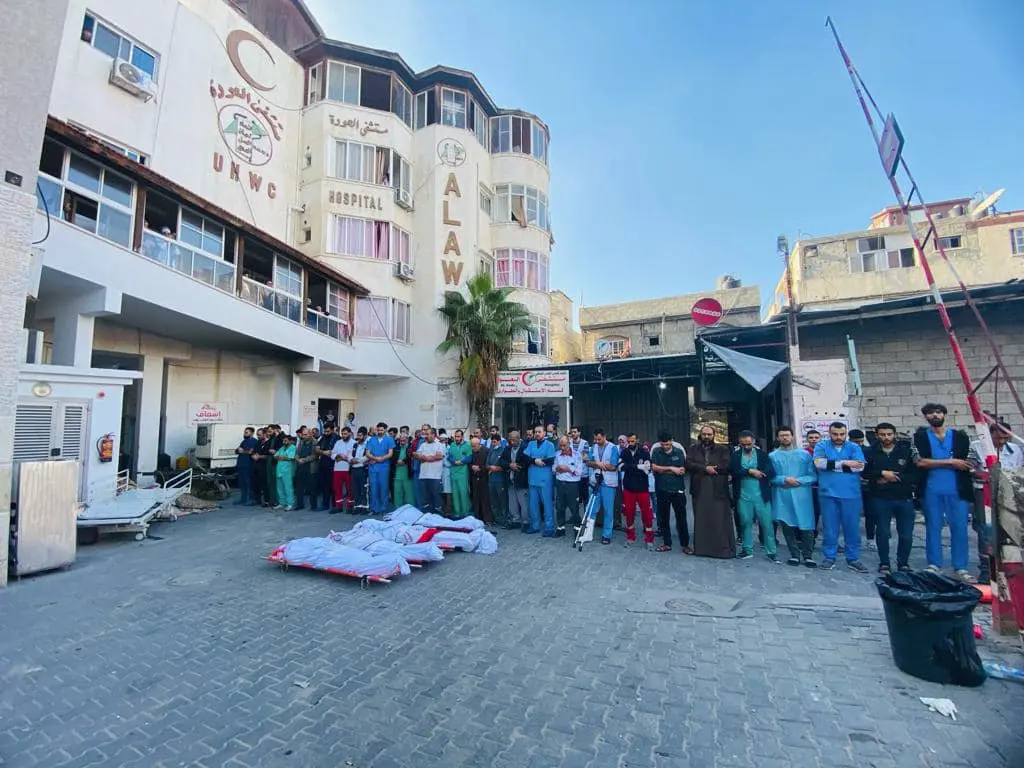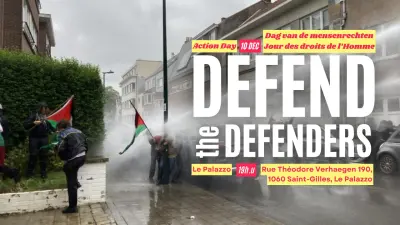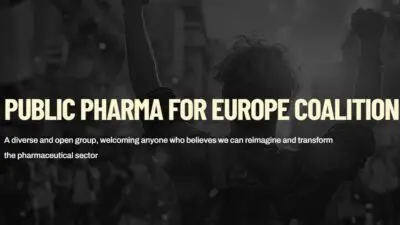Israel’s war machine can’t break the steadfastness of Palestinian health workers
Palestinian health workers and allies continue to oppose Israel’s attacks on health care in Gaza, build solidarity and resistance
November 22, 2023 by Peoples Health Dispatch
Al-Awda hospital in Jabalya refugee camp, is one of the latest health institutions in Palestine to be directly targeted by Israeli occupation forces. On Tuesday, November 21, at least three health workers were killed, and more were injured during one iteration of the attack. Among the dead is Ziad Al-Tatari, a neonatologist. It would seem particularly vicious to kill pediatricians as children continue to comprise the majority of the victim toll in Gaza. Yet Israel’s systematic attack against healthcare in Palestine makes it less surprising than it should be.
The surprise might be dimmed, but the shock lingers even for those who have experienced the impact of the occupation on the Palestinian health system firsthand, like Dr. Mads Gilbert.
During a discussion coordinated by No Cold War, the People’s Health Movement, and Viva Salud, Gilbert, who has worked in Palestine on and off for decades, described how incredible it seemed that the world chose to look away as Israel repeatedly attacked Palestinians’ right to health day after day.
He emphasized how much recognition health workers in Palestine deserve after working under occupation for 75 years. Their discipline and dignity in the face of the most horrific attacks are a living example of Palestinian sumud, or steadfastness, leaving no doubt that the health workers will remain as long as there are patients in the hospitals and people in the refugee camps.
The calm and dignity that such steadfastness combines were present in the voices of the Palestinian speakers at the discussion. When one looks at the rate of physical destruction of health infrastructure in Gaza — with only a quarter of hospitals still functioning, caved-in walls and floors, and no electricity — it can be difficult to imagine how it will be possible to rebuild it.
The health workers in Palestine, however, remain confident that it will happen. “Together, we will rebuild all the hospitals that have been destroyed in Palestine,” assured Aed Yaghi, the director of the Palestinian Medical Relief Society. “And I think we will live to witness one day, Palestinian Independence Day.“
Palestinian hospitals, health centers, health workers, and patients are not collateral damage as the Israeli occupation forces try to paint it. The determination to destroy them is part of the strategy to eliminate all traces of a social security network for Palestinians, making it impossible for people to return home, said Mustafa Barghouti from the Palestinian National Council.
Israel’s attacks following October 7 have been particularly violent. So violent, in fact, that Barghouti warned that Palestine is now facing three parallel war crimes: genocide, ethnic cleansing, and collective punishment. The extent of the violence of the Israeli occupation forces has escalated so much that relatives who had lived through the Nakba are talking of the current situation as its second iteration, warned Yaghi.
What we are witnessing should stir everyone, but we have to be careful that our reaction is not reduced to pity or charity. “Pity is colonial,” said Gilbert. What the health workers and the people of Palestine deserve instead is solidarity in the sense defined by Samora Machel — “mutual aid between forces fighting for the same objective“ — according to Gilbert.
“The two most beautiful words I know in Norwegian are love and solidarity. What we are witnessing today is an attempt to deny them,” Gilbert said. Efforts to stifle people’s campaigns for a ceasefire and respect for basic human rights in Palestine have not proven to be very successful, as public outrage against the indiscriminate destruction of the Gaza Strip has become more pronounced all over the world.
On the other hand, solidarity initiatives with Palestine have grown over the past weeks, including among health workers. The younger generation of health workers is particularly vocal about the necessity of standing up to those who would like to turn hospitals into military targets. Their protests have spanned the globe from Indonesia to Norway to South Africa. In Cape Town, several hundred health workers picketed outside the Red Cross Children’s Hospital on Tuesday, reiterating the demand for an immediate ceasefire and an end to the targeting of health personnel and infrastructure.
In some cases, instead of being heard by their governments and leaders of professional associations, health workers have faced censorship and harassment for their advocacy, as Rupa Marya from the Do No Harm coalition described happening in the US. The attempt by some health workers to build solidarity with Palestine has been followed by what Marya described as a “vicious backlash against the health workers,” one that could not be compared to anything she had seen previously when doctors and other health workers would adopt a more political stance.
Despite opposition by the establishment, health workers in the US are not giving up their fight to unmask the “horrific dark charade”, as Marya put it, that is being broadcast by corporate media. Their pursuit is mirrored in other countries of the Global North as well. In Belgium, health workers and volunteers from Medicine for the People (MPLP) are organizing vigils and participating in community events every day, making sure that the largest possible number of people hears about the war on Palestine.
Hanne Bosselaers, a general practitioner in one of MPLP’s health centers in Molenbeek, pointed out that speaking to the community by drawing from personal experience was the best way to draw people into the solidarity movements. Bosselaers worked in Al-Awda’s centers earlier in her career: according to her, lived experience, rather than statistics, is the best way to sensitize people about the Palestinian cause and stop Israeli impunity.
At this point, the importance of mounting pressure cannot be overstated. “Don’t just sit and praise — act,” Gilbert said. What the health workers in Palestine are showing to the world is a “teaching experience on resilience, on a culture that stands on different values than our capitalist health systems,” he pointed out. Recognizing and incorporating these values into the practice of solidarity movements is paramount for strengthening them and giving them the tools to truly stand with Palestine.


